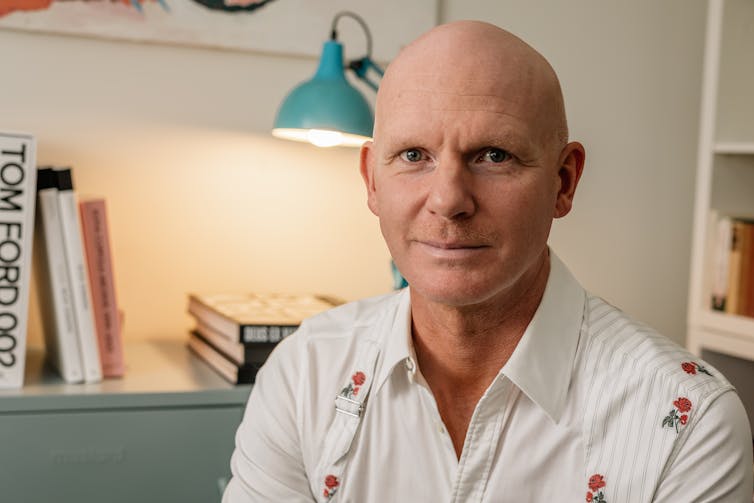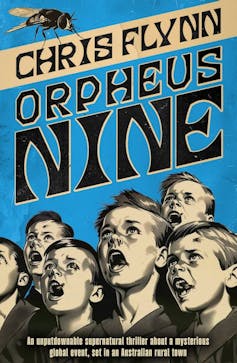Chris Flynn’s latest novel, Orpheus Nine, explores the small-town fallout of a global catastrophe: something so inexplicably cruel that it forces its characters, and us, to reassess the very point of existence. How do you continue when it seems like all hope, like any chance for a future, is gone?
It’s Saturday morning in the rural Australian town of Gattan and the kids are playing football. Everything’s pretty normal. While the children play, the parents unofficially coach from the sidelines, when they aren’t sniping at each other, that is.
We meet Jess, whose nine-year-old son Tyler is excelling on the field; Dirk, whose ten-year-old son Alex is also playing, despite technically being a little too old for the team; and Hayley, whose eight-year-old daughter Ebony wishes she was old enough to play.
Review: Orpheus Nine – Chris Flynn (Hachette)
Then, at 11am, everything changes. The children stop playing. They stand stock-still, fear on their faces, and begin to sing a line from King Lear: “As flies to wanton boys are we to the gods; They kill us for their sport.” And then they die. Horribly.
That is, all the players except Alex. Only the nine-year-olds are affected by this terrible, inexplicable event. Helpless, Jess is forced to watch Tyler die. Dirk is spared that horror; Alex has, just a week ago, turned ten. And Hayley’s entire world is now steeped in dread, because it keeps happening.
Every morning since, on the day a child turns nine, they freeze, they sing and they die. No one knows why. And no one can stop it.

A supernatural tipping point
Orpheus Nine, or O9, as the event becomes known, is a supernatural tipping point in an already stressed and destabilised world. Its consequences are complex: a storm of social, political, religious upheaval. The novel never loses sight of these big-picture impacts, noting failures of supply chains, growing conspiracy theories and protests met with state violence. But it does so through the lens of the people of Gattan, so we experience their impact on a personal level.
This is a powerful narrative choice. The big picture tends to hold us at a distance — intellectually, we can appreciate what’s going on with governments and large-scale demographic changes, and draw parallels to the world as we know it. But emotionally, it’s the “small-picture” stories of day-to-day lives that affect us. The characters are what we connect to. Their heartbreak, their anger, their fear make O9 real for us.
Chris Flynn is doing something very specific with his imagined town and the characters who inhabit it. Using them, he explores individual and communal reactions to grief, across different genders, classes and life experiences. Each of the main characters feels like a “type” or a “trope”, but if you ask me, this is no accident. Flynn seems purposeful and self-aware when it comes to this use of archetypes.

Jess is an Orphean, the term given to parents whose children have been taken by O9. She comes from a poor background, with deadbeat parents and an unstable childhood. In the aftermath of O9, she fights to make her voice heard in a way it never really was before.
In Hayley, we have a terrified mother, willing to do anything to save her daughter. As a “Saltless”, she is engaged in a campaign against “big salt”, believing its overconsumption contributes to O9 deaths. Her “healthy eating” crusade is her response to an uncontrollable situation, though it sometimes borders on abuse.
Dirk is heir to the fortune of Gattan’s wealthy family, a small-town member of the elite who seems to have it all, though his father was a monster behind closed doors. He is a Decadian: his child just missed the O9 cutoff. Conservative and traditional, he leans on his family name to assume authority over the town as the crisis worsens.
These characters represent different broader social experiences, so they all react to O9 and the new world order in different ways. But more than that, as new traumas bring old ones to the surface, Orpheus Nine skips back in time to show us what made these people who they are. How we process trauma doesn’t come out of the blue. It’s a result of our histories, our childhoods, our upbringings and the people around us.
Yes, Jess, Hayley and Dirk are all archetypes, but they are not reduced because of it. They don’t simply wear human masks over demographic faces. They even have the opportunity to grow and change, as the events of O9 undermine the structures of normal everyday life that would otherwise have kept them in their lane.
They kill us for their sport
Orpheus Nine is marketed as a supernatural thriller, but I’m not sure I agree with the category. Supernatural, definitely. But it doesn’t have the plot twists or action set pieces I’d equate with a thriller.
Instead, it’s a character-driven thought experiment that touches on the myriad ways we try to cope when something terrible and unexpected comes crashing into our lives. Through community organisations, online forums, religious cults, militant groups, government conspiracies – and even down to the ingredients in the food they consume – our characters try to reestablish some certainty, some control.
And don’t we all know how they feel! Thanks to COVID and the increasingly fraught state of global politics, we have all lived this. We are living it still.
I read Orpheus Nine in the week after ex-cyclone Alfred hit southeast Queensland. The supply chains were still struggling to recover, and there were rumblings of conspiracy theories online. Some of us got lucky and were spared any aftereffects for no obvious reason. Others were hit hard, unexpectedly and unforecasted: homes destroyed and lives ruined.
Like the “gods” of Orpheus Nine, who kill us for their sport, we are all at the mercy of an uncertain, at times uncaring, future. And we will each rise to meet it in our own way.

